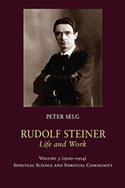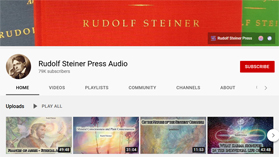
-
RUDOLF STEINER, LIFE AND WORK
Volume 3 (1900–1914) Spiritual Science and Spiritual Community
Peter Selg

“Without new impulses humanity will be overwhelmed and paralyzed—in ways we cannot even imagine today—by the domination of mere outer technology. Humanity will perish because all religious, scientific, philosophical, artistic, and—in a higher sense—ethical interests would be torn from the human soul. Without new spiritual impulses we will become living machines.” —Rudolf Steiner (CW 158)
This third volume of Peter Selg’s comprehensive presentation of Rudolf Steiner’s life and work begins with Steiner’s invitation to lecture in the Theosophical Society during the summer of 1900. From the outset of his theosophical involvement, Steiner was resolved to serve and develop the Western path to the spirit, traversed in full, conscious clarity of thought. He was therefore critical of the tendency to avoid the modern standards of a sound knowledge process in matters of spirituality and esotericism, and instead emphasized the importance of idealist philosophy as groundwork for understanding spiritual cognition. (“Whoever speaks of the coldness of the world of ideas can only think ideas, not experience them. Those who live the true life in the world of ideas feel in themselves the being of the world working in warmth that cannot be compared to anything else.” —Rudolf Steiner, Goethe's World View)
Although his approach did not always harmonize with theosophical pursuits, Rudolf Steiner recognized the sincere striving at the basis of this movement and agreed to take on increasingly greater responsibility for the German Section. Marie von Sivers, who would later become his wife, was his most supportive colleague during this time. At a decisive juncture, Steiner broke from the Theosophical Society to found the Anthroposophical Society, through which he would continue the development of modern spiritual science more freely in accord with his original intentions.
This volume covers the period during which Steiner wrote some of his foundational works: Christianity as Mystical Fact, Theosophy, Knowledge of the Higher Worlds, and An Outline of Esoteric Science. Peter Selg also describes the building of the first Goetheanum in Dornach as an artistic embodiment of esoteric wisdom, giving rise to an international working community, as well as the performance of the mystery dramas and Rudolf Steiner’s profound Christological lectures known as the Fifth Gospel.
Also available as a Hardback book
Also available as a Hardback book
21 October 2015; Trans.; M.Saar; SB; 244pp; 26 illustrations; pb;
£35.00 ISBN 9781621480884

